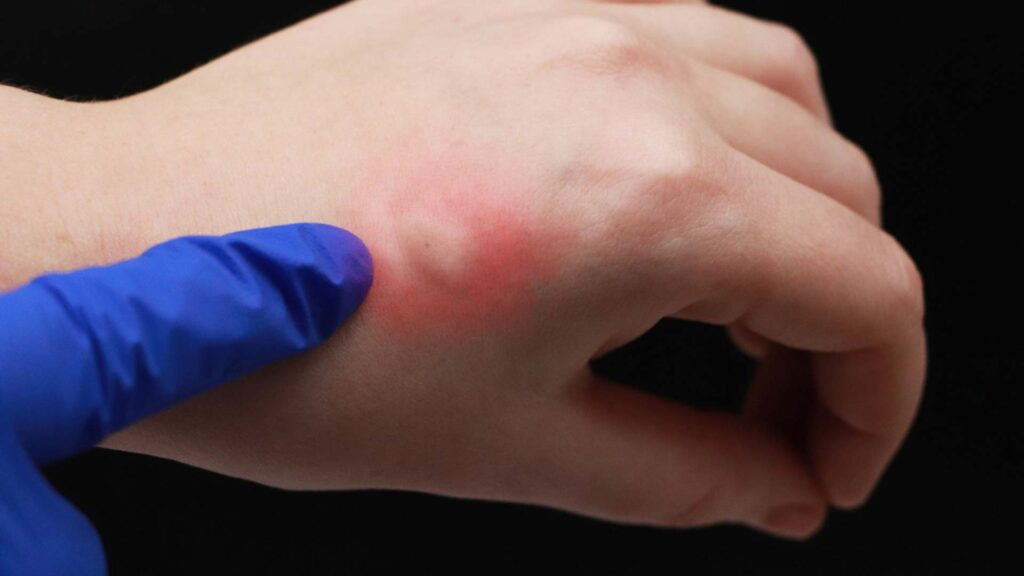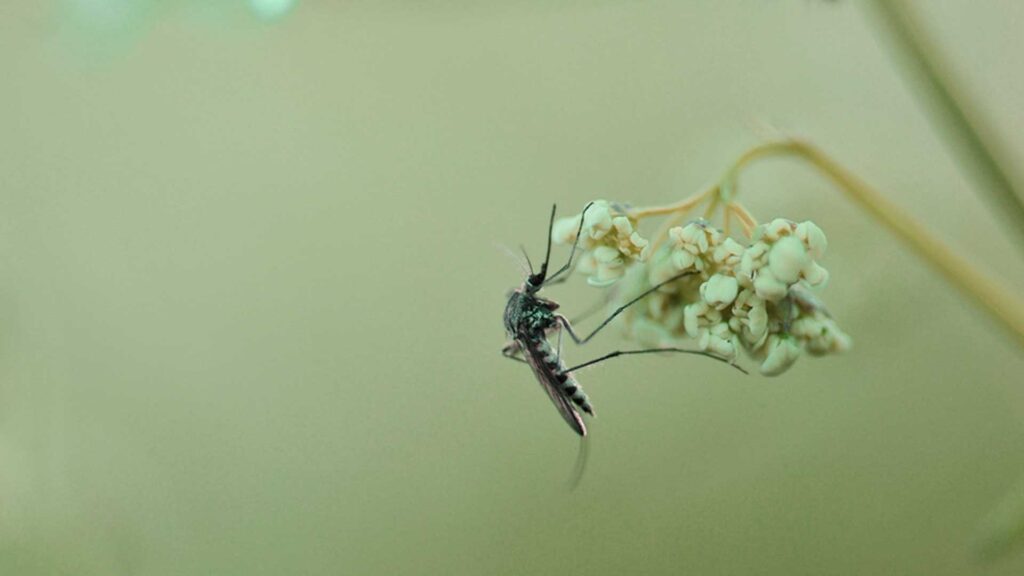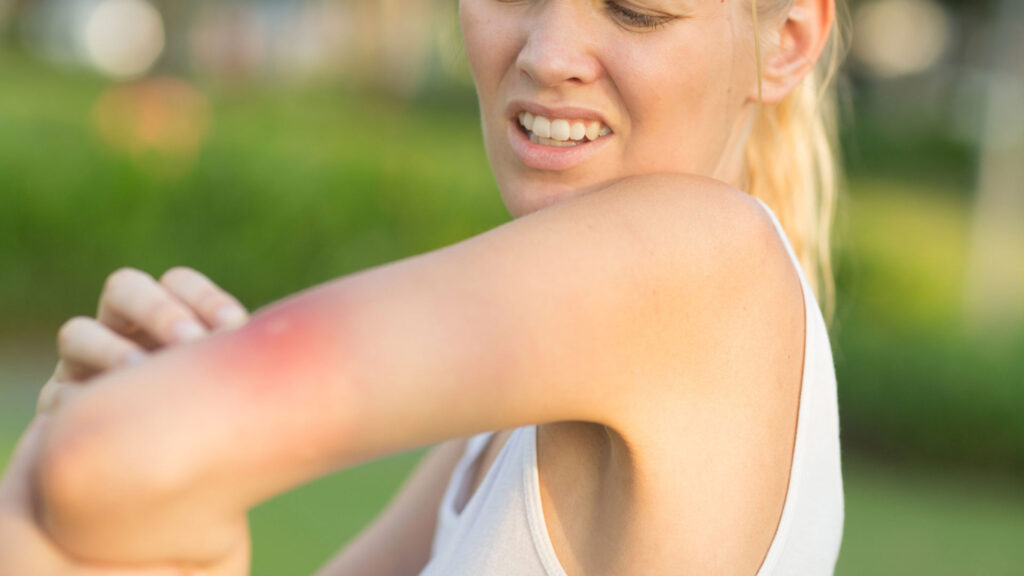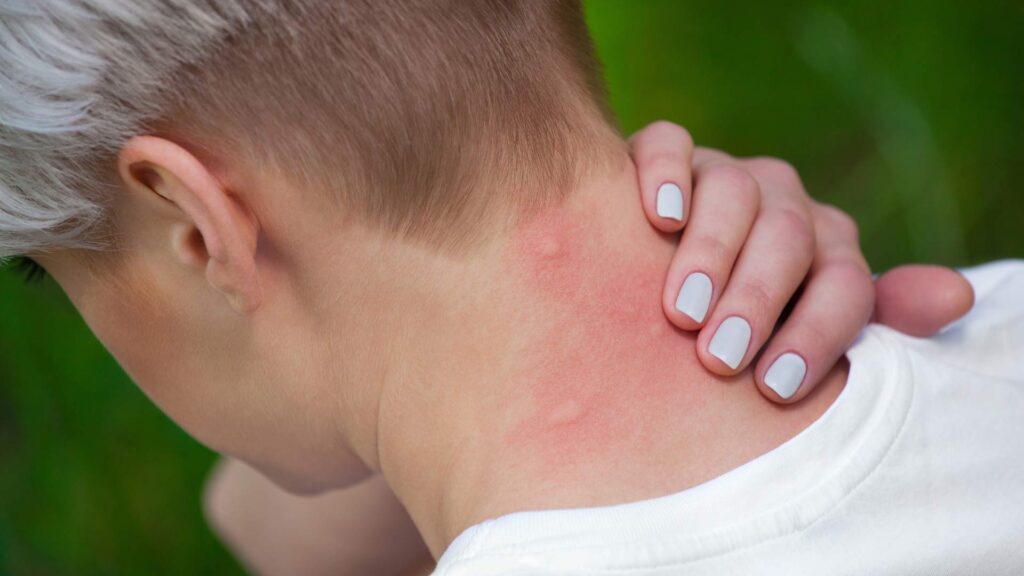How to tell if a mosquito bite has become infected
To tell if a mosquito bite has become infected, look for increased redness, swelling, and warmth around the bite area, along with pus or discharge. An infected bite may also cause fever and pain. These symptoms indicate that bacteria, possibly introduced through scratching, have infected the bite. If you notice these signs, clean the area with soap and water, apply antiseptic, and seek medical advice if symptoms persist or worsen.

As homeowners revel in the joys of their outdoor spaces, particularly during the warmer seasons, the presence of mosquitoes can be both a nuisance and a health concern. These tiny, buzzing insects not only disrupt peaceful evenings but also pose a risk through their bites. While most mosquito bites result in nothing more than an itchy annoyance, there are instances when these bites can escalate into infected wounds, leading to more serious health issues. It’s essential for homeowners to understand the dynamics of mosquito bites, the risks they carry, and the measures that can be taken to prevent and manage potential infections.
Mosquitoes are more than just unwelcome guests in our yards; they are vectors for various diseases and can transmit pathogens through their bites. In most cases, the body’s reaction to a mosquito bite is mild, characterized by a small, itchy, red bump. However, complications arise when these bites become infected, a situation that can occur more frequently than many realize. An infected mosquito bite can transform from a minor irritation into a significant medical concern, marked by symptoms that go beyond the usual itchiness and discomfort.
The transition from a simple bite to an infection is often due to a combination of factors, including the mosquito’s saliva, the presence of pathogens, and the individual’s response to the bite. When a mosquito bites, it injects saliva into the skin, which can cause an allergic reaction. This reaction is typically what causes the itching and swelling associated with mosquito bites. However, if the bite is excessively scratched or if the mosquito was carrying harmful pathogens, the risk of infection increases significantly.
For homeowners, the threat of mosquito bites and the potential for infection is a pressing concern, especially in areas with high mosquito populations. Understanding the signs of an infected mosquito bite, the preventive measures that can be taken to reduce the likelihood of being bitten, and the steps to follow if an infection occurs are crucial in maintaining not just personal health, but also the wellbeing of families and communities.
In this article, we delve into the intricacies of mosquito bite infections, offering homeowners a comprehensive guide on how to identify, prevent, and manage these occurrences. By equipping themselves with this knowledge, homeowners can enjoy their outdoor spaces with greater peace of mind, knowing they are prepared to handle the challenges posed by these common yet potentially harmful insects.
Identifying an Infected Mosquito Bite: A Detailed Guide
Signs of Mosquito Bite Infection and Possible Causes
| Signs of Infection | Description | Possible Causes |
|---|---|---|
| Increased Redness | The area around the bite becomes noticeably redder than usual. | Bacterial entry into the skin, often due to scratching. |
| Swelling | The bite area swells more than a typical mosquito bite. | Inflammatory response to infection. |
| Warmth Around the Bite | The skin around the bite feels warm or hot to the touch. | Increased blood flow to the area as part of the body’s immune response. |
| Pus or Discharge | Yellow or greenish fluid oozing from the bite. | Accumulation of pus, indicating a bacterial infection. |
| Fever | Elevated body temperature, sometimes accompanied by chills. | Systemic response to infection, indicating it may be spreading beyond the bite. |
| Persistent Itching | Intense and prolonged itching at the bite site. | Body’s reaction to mosquito saliva, possibly exacerbated by infection. |
| Pain | The bite area becomes painful, beyond the usual discomfort of a mosquito bite. | Inflammation and possible secondary infection in the bite area. |
Mosquito bites are a common occurrence, especially in areas where these insects are prevalent. While most bites are harmless and cause only minor discomfort, there are instances when a bite can lead to an infection. Identifying an infected mosquito bite is crucial for timely and effective treatment. Here’s a detailed look at the signs and symptoms that distinguish an infected bite from a typical mosquito bite.
Recognizing the Signs of Infection
- Increased Redness and Swelling: A normal mosquito bite typically results in a small, pinkish bump that may be slightly swollen. However, if the bite area becomes increasingly red and swollen, this could be a sign of infection. The redness often extends beyond the initial bite site.
- Warmth Around the Bite Area: When a bite is infected, the skin around it may feel warm to the touch. This warmth is a result of the body’s immune response to the infection.
- Pus or Discharge: One of the more concerning signs of an infected mosquito bite is the presence of pus or a clear fluid oozing from the bite. This indicates that the body is trying to fight off bacteria at the site of the bite.
- Pain or Tenderness: While mosquito bites can be itchy, they are not typically painful. If you experience pain or tenderness around the bite area, especially when touched, it could be a symptom of infection.
- Fever: In some cases, an infected mosquito bite can cause a fever. This systemic response indicates that the body is fighting an infection that may be more serious than a localized skin infection.
- Lymph Node Swelling: Nearby lymph nodes may swell in response to an infection. For example, a bite on the arm could lead to swollen lymph nodes in the armpit.
- Increased Itching: While itching is a common reaction to mosquito bites, excessive itching, especially if it leads to breaking the skin, can exacerbate the risk of infection and may also be a response to the body dealing with an infection.
It’s important to differentiate between a normal reaction to a mosquito bite and signs of infection. A normal bite will typically present as a small, itchy bump that fades over a few days. In contrast, an infected bite worsens over time, with symptoms like increased redness, swelling, and other signs mentioned above.
If you notice any of the above symptoms, particularly pus or discharge, increased pain, fever, or if the redness and swelling continue to expand, it’s important to seek medical attention. These signs indicate that the body’s immune response is not sufficient to handle the infection on its own.
Being able to identify an infected mosquito bite is a valuable skill, especially in areas where mosquitoes are common. By paying attention to the signs and symptoms of infection, you can take timely action to treat the bite and prevent more serious complications. Remember, while most mosquito bites are harmless, staying vigilant about potential infections is key to maintaining good health.
Causes of Infection
Understanding the causes of infection in mosquito bites is crucial for homeowners looking to maintain a healthy living environment. While most mosquito bites are harmless, certain conditions can lead to infection, which, if left untreated, can escalate into more serious health issues.
- Bacteria Entry Through Scratching: The most common cause of infection in mosquito bites is the introduction of bacteria through scratching. Mosquito bites are inherently itchy due to the body’s reaction to the mosquito’s saliva. When a person scratches the bite, bacteria from under the fingernails or on the skin can enter the small wound, leading to an infection.
- Pathogen Transmission: Mosquitoes can carry various pathogens, including viruses and parasites. While not all mosquitoes are carriers, those that are can transmit diseases like West Nile virus, Zika virus, and malaria through their bites. The risk of such diseases depends largely on geographic location and the prevalence of disease-carrying mosquito species in the area.
- Compromised Skin Barrier: In some cases, the skin’s protective barrier may be compromised due to pre-existing conditions like eczema or psoriasis. This makes the skin more susceptible to infections, not just from mosquito bites but from other minor wounds as well.
- Environmental Factors: The environment in which the mosquito bite occurs can also play a role in infection. Bites sustained in areas with high bacterial presence, such as near stagnant water or in unsanitary conditions, have a higher risk of becoming infected.
- Delayed or Inadequate Care: Neglecting to properly care for a mosquito bite can increase the risk of infection. This includes failing to clean the bite area promptly and thoroughly, or using inappropriate remedies that might irritate the skin further.
- Individual Immune Response: Individual differences in immune system responses can also influence the likelihood of infection. Some people may have stronger reactions to mosquito bites, leading to more intense itching and a higher propensity to scratch, thereby increasing the risk of infection.
- Repeated Exposure: Frequent mosquito bites can sensitize the skin, leading to more severe reactions and potentially increasing the risk of infection. This is particularly relevant for individuals living in areas with high mosquito populations.
By understanding these causes, homeowners can take more informed steps to prevent mosquito bite infections. This includes implementing effective mosquito control measures, practicing good hygiene, and being mindful of skin care, especially after sustaining a mosquito bite.
Preventive Measures
Preventing mosquito bites is a multifaceted approach that involves both personal protection and environmental management. Homeowners can significantly reduce the risk of mosquito bites and potential infections by adopting the following strategies:
Environmental Control:
- Eliminate Standing Water: Mosquitoes breed in stagnant water. Regularly check and empty water from flowerpots, gutters, buckets, pool covers, pet water dishes, discarded tires, and birdbaths.
- Proper Landscaping: Keep your yard well-trimmed. Tall grass and overgrown vegetation provide mosquitoes with a cool place to rest.
- Use Mosquito-Repelling Plants: Consider planting mosquito-repellent flora such as citronella, lavender, marigolds, and basil around your home.
- Drainage Management: Ensure proper drainage in your yard to prevent water accumulation. If you have a pond or water feature, consider adding mosquito-eating fish like Gambusia or using mosquito dunks that are harmless to other wildlife.
Barrier Methods:
- Window and Door Screens: Install and maintain fine-mesh screens on all windows and doors to prevent mosquitoes from entering your home.
- Air Conditioning: Use air conditioning when possible as it is an effective way to keep mosquitoes out due to the closed and cool environment.
- Bed Nets: If mosquitoes are a significant problem, especially at night, use bed nets treated with insecticide for added protection.
Personal Protection:
- Insect Repellent: Apply EPA-registered insect repellents containing DEET, picaridin, IR3535, or oil of lemon eucalyptus. Follow the product instructions for application and reapplication.
- Appropriate Clothing: Wear long-sleeved shirts and long pants when outdoors, particularly during dawn and dusk when mosquitoes are most active. Consider treating clothing with permethrin for additional protection.
- Avoid Peak Mosquito Hours: Try to avoid outdoor activities during early morning and evening hours when mosquitoes are most active.
Community Efforts:
- Participate in Local Control Programs: Engage with local mosquito control efforts and stay informed about any mosquito-borne disease outbreaks in your area.
- Educate and Collaborate: Share preventive measures with neighbors. A community-wide effort is more effective in reducing the overall mosquito population.
Monitoring and Maintenance:
- Regular Inspections: Regularly inspect your property for potential mosquito breeding sites and take prompt action to eliminate them.
- Professional Assistance: If you have a persistent mosquito problem, consider consulting a professional pest control service for more comprehensive solutions.
By implementing these preventive measures, homeowners can significantly reduce the likelihood of mosquito bites and the associated risks. It’s a combination of personal vigilance, environmental management, and community involvement that creates a safer and more comfortable living space.
Mosquito-Proof Your Home:
- Install Screens: Fit windows and doors with fine mesh screens to keep mosquitoes out.
- Regular Maintenance: Repair any holes in screens and seal gaps around windows and doors.
Eliminate Breeding Sites:
- Remove Standing Water: Regularly empty water from flowerpots, birdbaths, buckets, and barrels.
- Maintain Your Yard: Keep gutters clean and ensure your yard has proper drainage to prevent water accumulation.
Personal Protection:
- Use Repellents: Apply EPA-approved insect repellents containing DEET, picaridin, or oil of lemon eucalyptus.
- Dress Appropriately: Wear long-sleeved shirts and long pants, especially during dawn and dusk when mosquitoes are most active.
Natural Deterrents:
- Plant Mosquito-Repelling Plants: Consider planting citronella, lavender, or marigolds around your home.
- Use Essential Oils: Oils like eucalyptus and tea tree can act as natural repellents.
Outdoor Precautions:
- Use Mosquito Nets: Employ mosquito nets around outdoor seating areas or over beds if sleeping with open windows.
- Avoid Peak Times: Try to limit outdoor activities during early morning and evening hours when mosquitoes are most active.
Community Efforts:
- Participate in Local Control Programs: Engage in community efforts to control mosquito populations.
- Stay Informed: Keep up-to-date with local health department warnings about mosquito-borne diseases in your area.
Keep up-to-date with local health department warnings about mosquito-borne diseases in your area.
By incorporating these preventive measures, homeowners can significantly reduce the risk of mosquito bites and the potential for infections.
First Aid for Mosquito Bites
Effective first aid for mosquito bites begins with prompt and proper care to prevent infection and alleviate discomfort. After being bitten, the immediate step is to gently wash the affected area with soap and water. This simple action helps remove any irritants left by the mosquito and reduces the risk of secondary infection caused by scratching. It’s important to avoid scratching the bite, as this can break the skin and introduce bacteria, potentially leading to an infection.
For reducing itchiness and swelling, over-the-counter remedies can be highly effective. Topical antihistamines or hydrocortisone creams can be applied to the bite area to alleviate itching. These products work by reducing the body’s inflammatory response to the mosquito’s saliva. For those preferring a more natural approach, home remedies like a paste of baking soda and water, or the application of aloe vera, can provide soothing relief. Ice packs or a cold compress can also be used to reduce swelling and numb the area, offering temporary relief.
In cases where a bite causes significant discomfort or appears to be getting worse, it may be necessary to take oral antihistamines to control the symptoms. However, if the bite shows signs of infection, such as increasing redness, warmth, pus, or if it’s accompanied by fever, it’s crucial to seek medical attention. Early intervention in such cases can prevent more serious complications. Remember, while most mosquito bites are harmless, attentive care and monitoring are key to ensuring they remain a minor inconvenience.
When to Seek Medical Attention
Seeking medical attention for a mosquito bite is necessary when certain symptoms indicate a possible infection or a severe allergic reaction. If the bite area becomes increasingly red, swollen, or warm to the touch, these are signs of a potential infection. Additionally, the presence of pus or a discharge, especially if accompanied by a fever or swollen lymph nodes, warrants a visit to a healthcare professional. It’s crucial to monitor the bite for changes in size, color, or pain intensity, as these can be indicators of a worsening condition.
In rare cases, mosquito bites can trigger severe allergic reactions, known as anaphylaxis. Symptoms of a severe allergic reaction include difficulty breathing, hives, swelling of the face, lips, or throat, dizziness, and a rapid heartbeat. This is a medical emergency, and immediate medical care is necessary. Even if the symptoms seem mild initially, they can quickly escalate, making it vital to err on the side of caution. Remember, timely medical intervention can prevent complications and ensure a quick recovery from mosquito bite-related infections or allergic reactions.
Navigating the Challenges of Mosquito Bites in the Home Environment
In the realm of home safety and health, the management of mosquito bites transcends mere irritation relief; it embodies a proactive approach to safeguarding the well-being of household members. As homeowners, understanding the broader implications of mosquito bites, particularly when they become infected, is a critical aspect of maintaining a healthy living space.
The journey begins with education and awareness. Recognizing the potential hazards associated with mosquito bites, such as the risk of infection and the transmission of mosquito-borne diseases, empowers homeowners to adopt more effective preventive strategies. This knowledge serves as a foundation for creating a living environment that minimizes the risks posed by these common pests.
Preventive measures, such as maintaining screens on windows and doors and eliminating standing water, are more than mere tasks; they represent a commitment to health and safety. These actions, coupled with the use of appropriate repellents and protective clothing, form a robust defense against mosquito intrusion and bites.
However, despite the best preventive efforts, mosquito bites can occur. In these instances, the focus shifts to prompt and appropriate response. The immediate cleaning and treatment of bites are not just steps in a first-aid process; they are crucial actions that can prevent the escalation of a minor bite into a more serious infection. The use of over-the-counter remedies to alleviate symptoms is a testament to the power of self-care in managing health risks at home.
The role of professional medical advice cannot be overstated, especially when symptoms of an infection manifest or in the event of severe reactions. Seeking medical attention is a responsible and necessary step in ensuring that the health implications of a mosquito bite are appropriately addressed. It underscores the importance of not underestimating the potential severity of what may initially seem like a trivial issue.
The management of mosquito bites in the home environment is a multifaceted endeavor. It encompasses preventive measures, immediate care, and the judicious use of medical resources. As homeowners navigate these challenges, they play a pivotal role in fostering a safe and healthy living space. The collective efforts in understanding, preventing, and responding to mosquito bites not only mitigate immediate health risks but also contribute to the broader goal of maintaining a healthy home environment. This comprehensive approach is essential in an era where environmental health concerns are increasingly intertwined with our daily lives.
Frequently Asked Questions About Mosquito Bite Infections
What are the common signs of an infected mosquito bite?
The common signs include increased redness and swelling around the bite, warmth or tenderness to the touch, pus or a discharge, and sometimes fever or swollen lymph nodes near the bite.
How can I differentiate between a normal mosquito bite and an infected one?
A normal mosquito bite typically presents as a small, itchy, red bump. An infected bite, however, will often be more painful, larger in size, and may have pus or a crusty appearance.
What causes a mosquito bite to become infected?
Infections usually occur from excessive scratching, which introduces bacteria from the skin into the bite wound. In rare cases, mosquitoes can transmit bacteria or viruses directly through their saliva.
How can I prevent mosquito bites from getting infected?
Avoid scratching the bite. Keep the area clean and apply an antiseptic if necessary. Use insect repellent and wear protective clothing to prevent bites.
Are there any home remedies for treating an infected mosquito bite?
Clean the area with soap and water and apply an over-the-counter antibiotic ointment. Cold compresses can reduce swelling. If itching is severe, topical antihistamines or hydrocortisone cream may help.
When should I see a doctor for a mosquito bite?
Seek medical attention if the bite is excessively painful, if there’s a significant increase in redness or swelling, if you develop a fever, or if the symptoms don’t improve with home treatment.
Can infected mosquito bites lead to more serious health issues?
While rare, infected bites can sometimes lead to cellulitis, a bacterial skin infection, or lymphangitis, an infection of the lymph vessels. In very rare cases, it can lead to blood infections.
Are certain people more at risk of getting an infected mosquito bite?
Individuals with weakened immune systems or those with skin conditions like eczema may be more susceptible to infections from mosquito bites.
How long does it take for an infected mosquito bite to heal?
With proper care, most infected mosquito bites start to improve within a few days. Complete healing can take up to a week or more, depending on the severity of the infection.
Can mosquito bites transmit diseases?
Yes, mosquitoes can transmit various diseases like West Nile virus, Zika virus, and malaria. However, the likelihood of disease transmission depends on the mosquito species and geographic location.




